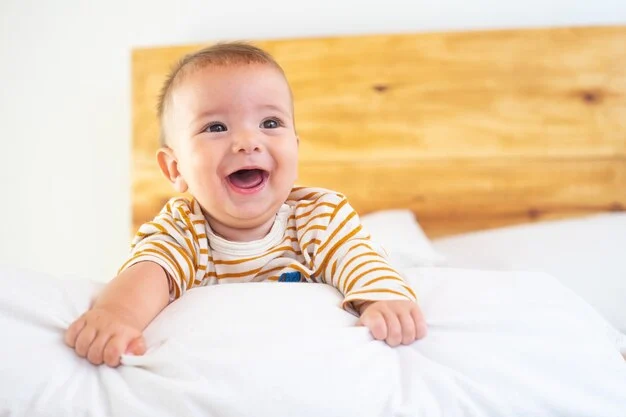I’ve been down this road before, so I thought the second time would be smoother and quicker. I felt prepared for the sleepless nights, the endless feedings, and the countless diaper changes. I was ready.
As my second pregnancy progressed, a comforting sense of calm enveloped me. My body seemed to remember how to carry a baby again. From the moment the pregnancy test showed positive, my belly started to round out, and I looked as pregnant at nine weeks with my daughter as I had at twenty weeks with my son. Family members exchanged knowing smiles as I tried to hide my growing bump under flowy tops. My body was already leaking colostrum weeks ahead of my due date, a familiar reminder of the journey ahead. I felt as if I had this all figured out.
With three years of motherhood under my belt, my confidence soared. I was thrilled to have successfully breastfed for 18 months and could change a diaper in my sleep. I was a Super Mom, navigating the chaos with grace (and a bit of peanut butter on my yoga pants). I had found my footing, though I still wrestled with insecurities about my body and evolving relationships. But when it came to motherhood, I felt empowered.
Labor came, and I felt in control, breathing through the contractions and delivering a healthy baby girl in under three hours. She latched immediately and nursed with ease. Everything was going according to plan. Until it wasn’t.
Just a few hours after giving birth, I sat in my hospital bed surrounded by family when I suddenly felt a warm pool beneath me. Panic struck—”I can’t breathe!” I gasped, feeling as though something invisible was choking me. Then, everything went dark.
I came to, surrounded by doctors and nurses, my husband’s eyes wide with fear, and the cries of my newborn filling the air. Pain radiated through me, and I realized I had lost control of my body.
A postpartum hemorrhage was not part of my birth plan. I hadn’t anticipated the overwhelming weakness and exhaustion that followed. I struggled to stand, let alone care for my newborn. Blood transfusions, medications, and a shocking experience left me grappling with feelings that were both traumatic and miraculous. How could I reconcile such conflicting emotions?
Because of the hemorrhage, my milk was slow to come in. Days passed, and I was still producing only drops. My sleepy newborn struggled to nurse effectively, which made her weight plummet. I hadn’t planned for this breastfeeding challenge.
The early days at home felt endless. I juggled caring for myself and my two children while trying to pump, supplement, and feed every two hours. My own needs were barely met as I managed to squeeze in iron supplements and a quick lunch for my 3-year-old.
Nights were the hardest. Intrusive thoughts invaded my mind, painting terrifying pictures of the birth experience and leaving me anxious about being alone with my children. Doubts about my abilities to care for them crept in, threatening to shatter my confidence. A dark cloud loomed over me, making it hard to connect with my husband and kids. I floated through my days as if on autopilot.
I managed a weak smile at my son’s silly new song, but joy felt distant. I lovingly touched my one-week-old daughter’s head, yet dread about the upcoming night filled my thoughts. I couldn’t shake the feeling that this darkness would be my forever.
In the days leading up to the birth, the idea of not enjoying motherhood was unimaginable. Yet, in those dark moments, I couldn’t find the joy. The guilt consumed me. Leaving the comfort of my son’s bedroom during our nightly reading routine became torturous. I felt suffocated by the pressure to be happy and playful.
I questioned my decision to have another baby. My heart ached as I looked down at my baby girl, who resembled me so strongly. That guilt was overwhelming.
As I wept, mourning my former self, my husband stepped in to take over. He managed the household, cared for our kids, and encouraged me to spend time with friends. He kept our lives running smoothly while I struggled to cope. He even called the doctor when he sensed something was wrong, driving me to my appointment and reassuring me that everything would be okay. Deep down, I struggled to believe him, but I clung to hope.
My doctor was kind and understanding, quickly diagnosing me with postpartum depression and OCD. I hesitated to take medication, fearing it would affect my dwindling milk supply—my lifeline to feeling like a mother. I decided to try a low dose of a breastfeeding-compatible medication. Gradually, the fog began to lift. My anxiety subsided, and I regained control over my thoughts. Laughing at my son’s new song became genuine, and my 2-month-old’s toothless grin began to mend my heart.
Those days were the most challenging of my life. I still feel anxiety creeping in and mourn my birth experience, but I now have a deeper appreciation for my children and a renewed trust in my husband. I empathize with others facing postpartum challenges and have discovered a passion for supporting new mothers. I found strength within myself that I never knew existed.
I’ve got this.
For more insights on navigating motherhood and family planning, check out our other blog posts like this one and learn more about at-home insemination methods from Make a Mom. For comprehensive information on pregnancy and IVF, visit this helpful resource.
